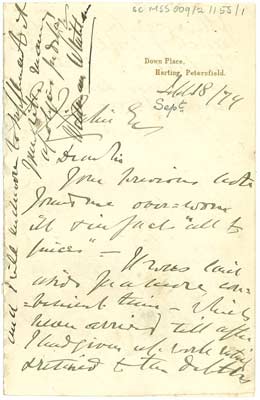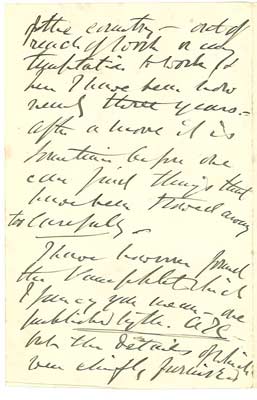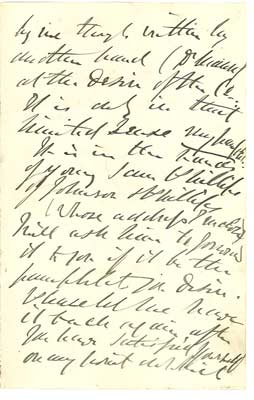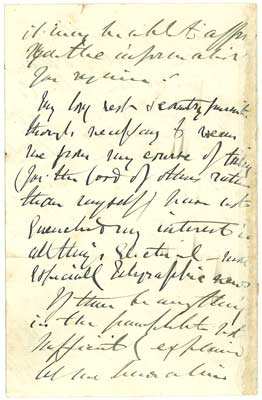Introduction: Edward O.W. Whitehouse, “Wildman Whitehouse” as he generally styled himself, was a surgeon by profession and an electrical experimenter by avocation. In 1856 he was appointed Electrician to the Atlantic Telegraph Company and was responsible for the testing of the 1857/58 cables, and for the design and operation of the equipment which would transmit the telegraph signals between Ireland and Newfoundland.
In 1879 telegraph historian John J. Fahie corresponded with Whitehouse about his work on the Atlantic cable project. Fahie’s letters to Whitehouse are lost, but four letters from Whitehouse are in the Fahie collection at the IET Archives. One of these is of particular interest and is the subject of this article.
|
John Joseph Fahie (1846 - 1934) was a member of the Society of Telegraph Engineers (later the Institute of Electrical Engineers and now the IET) and had a keen interest in the history of the field. Fahie’s papers from 1863-1918 are in the IET Archives (SC MSS 009); the collection consists of material assembled by Fahie in connection with his research on the pioneers of inventions such as the electric telegraph, the wireless telegraph and the electric light, and includes four letters from Wildman Whitehouse to Fahie.
The IET website has this short biography of Fahie:
John Joseph Fahie was born in 1846 in Tipperary and educated at the Classical University of Ireland. He attended evening classes 1865-67 where he learnt about magnetism and electricity, while working for the Electric and International Telegraph Company. In 1867 he joined the Indo-European Government Telegraph Department and served at Jask as superintendent of the cable station, Shiraz and Teheran until his retirement from the Department due to ill health in 1897. He developed a system of duplex telegraphy which he operated on the Shiraz-Teheran line, and wrote many articles to the technical press and IEE Journal. In 1874 he donated £100 to the IEE for the establishment of a premium for the best paper written each year dealing with telegraphy and telephony.
He was also a keen student of the history of science and concentrated his work on researching the pioneers of inventions such as the electric telegraph, the wireless telegraph and the electric light. In doing so he brought to prominence names which would otherwise have been unknown depsite their important contributions to science, including Edward Davy, Henry Staite, William Petrie and D E Hughes. He also did considerable work on Galileo.
Fahie published ‘A History of Electric Telegraphy to 1837’ (1884); ‘A History of Wireless Telegraphy 1838-1899’ (1899); and two works on Galileo, ‘Galileo: his life and work’ (1903) and ‘A Memorial of Galileo Galilei 1564-1642; Portaits and Paintings, Medals and Medallions, Busts and Statues, Monuments and Mural Inscriptions’ (1929) . He was elected an Associate of the IEE in 1873 and a Member in 1877. He died in Broughton in Furness on 12 June 1934, one of the IEE’s oldest members.
The Fahie collection at the IET includes letters from people who worked in early telegraphy; pamphlets and newspaper cuttings about the Atlantic Telegraph and the telegraphs to India; Fahie’s own articles and letters; and a manuscript for his book ‘A History of Electric Telegraphy from the Earliest Times to 1837’.
Fahie corresponded with Wildman Whitehouse in 1879 and 1883 (dates based on four letters from Whitehouse to Fahie in the IET Archives), in an attempt to obtain documents and stories from Whitehouse’s involvement with the Atlantic Telegraph Company and the Atlantic cable (1856-58). However, there is nothing on Whitehouse in Fahie’s published works and it’s not known if the two ever met.
In his 1879 letter to Fahie, Whitehouse clears up the mystery of the anonymous author of a promotional book published by the Atlantic Telegraph Company in 1857: The Atlantic Telegraph: A History of Preliminary Experimental Proceedings and a Descriptive Account of the Present State and Prospects of the Undertaking (titled on the cover The Atlantic Telegraph: A Descriptive History.
This 69-page pamphlet has no author listed on its title page, and it was widely believed at the time to have been written by Whitehouse. In a letter to Engineer in 1858, the year after the book’s publication, Whitehouse said that he had only given advice to the “talented popular writer” hired to write it; see note 30 in Bruce J. Hunt’s paper.
But in Whitehouse’s 1879 letter to John Fahie, he was rather less reticent:
“I have however found the pamphlet which I fancy you mean – one published by the ATC but the details of which were chiefly furnished by me though written by another hand (Dr Mann) at the desire of the Co. It is only in that limited sense my pamphlet.”
The bibliography in Bern Dibner’s 1959 book The Atlantic Cable also lists Mann as the author. In at least one copy of the book (Samuel Morse’s own copy, given to him by Cyrus W. Field and now at Cornell University’s Kroch Library) the initals “R.J.M.” appear on page 69, the last page of the text. In other copies the initials have been overprinted with a black bar.
Mann and Whitehouse were close contemporaries, Mann being born in 1817, a year after Whitehouse. Mann studied medicine at University College, London, from 1837 to 1840 [Oxford DNB]; Whitehouse was at UCL 1838-40. Both were members of the Royal College of Surgeons, and Mann. like Whitehouse, abandoned the medical profession in the early 1850s for other pursuits; in Mann’s case, writing. Both men had similar, wide-ranging interests; Mann wrote books on astronomy and chemistry and many articles for Chambers’s Edinburgh Journal, and was later President of the Meteorological Society at the same time as Whitehouse was a Member of Council. When in 1857 the Atlantic Telegraph Company needed a promotional pamphlet written on the workings of the cable, Mann must have been the natural choice as its author.
Scans of this letter and a full transcript are shown below. Thanks to Steven Roberts and Bruce J. Hunt for help with deciphering Whitehouse’s handwriting.

Page 1 |

Page 2 |

Page 3 |

Page 4 |
Whitehouse-Fahie letter (SC MSS 009/2/155/1).
Scans courtesy of IET Archives |
Down Place,
Harting, Petersfield.
Sept 18 / 79
J J Fahie Esq
Dear Sir
Your previous note found me over-come ill & in fact “all to pieces”.
It was laid aside for a more convenient time - which never arrived till after I had given up work entirely & retired to the depths of the country - out of reach of work or any temptation to work & here I have been now nearly three years. After a move it is some time before one can find things that have been stowed away too carefully.
I have however found the pamphlet which I fancy you mean - one published by the ATC but the details of which were chiefly furnished by me though written by another hand (Dr Mann) at the desire of the Co. It is only in that limited sense my pamphlet.
It is in the hands of young Sam Phillips of Johnson & Phillips (whose address I enclose). I will ask him to forward it to you if it be the pamphlet you desire. Please let me have it back again, after you have satisfied yourself. On any point of conflict it may be able to offer you the information you require.
My long rest & country pursuits though necessary to wean me from my course of toiling (for the good of others rather than myself) has not quenched my interest in all things electrical - more especially telegraphic news.
If there be anything in the pamphlet not sufficiently explained let me have a line and I will endeavour to supplement it.
Yours with many apologies for delay.
Wildman Whitehouse |
Bruce Hunt adds a further note on R.J. Mann’s authorship of the pamphlet. In Latimer Clark’s extensive library (now the Wheeler Gift Collection) is a copy of the pamphlet with Mann’s initials obscured. Clark evidently questioned this with Mann, as his library also includes a letter from Mann to Clark with an explanation:
5 Kingsdown Villas
Wandsworth Common
SW
Novr. 12, 1880
My Dear Sir,
I have only one copy of the Atlantic Telegraph Pamphlet — It is possible that I may light upon a second copy somewhere amongst some old acquaintances to whom I may have given one in the early days. — If I do I shall take care to bag it for you.
I find in my copy my initials “R.J.M.” stand where the black lozenge appears in the library copy. It is on my mind that I remember to have heard that the Company made some change of this kind after issue of the early copies, and after I had left England, because they wished the Pamphlet to appear with the authority of an official document. I prepared the Pamphlet as a labour of love at the request of Sam Gurney who was at that time the chairman of the Company, and with whom I was on terms of personal friendship. — But I find that the Company subsequently sent me an Honorarium of 50 guineas. — The erasure of the initials in all probability was in some way contemporaneous with this acknowledgment.
Believe me
Very truly yours
Robert James Mann
Latimer Clark Esq. |
[Atlantic Telegraph Reports 621.382 A 09a2]
Mann’s note in this letter that the Company wanted the pamphlet to appear as an official document would also explain Whitehouse’s reticence in 1858 to comment on its authorship.
Return to the Wildman Whitehouse main page |

